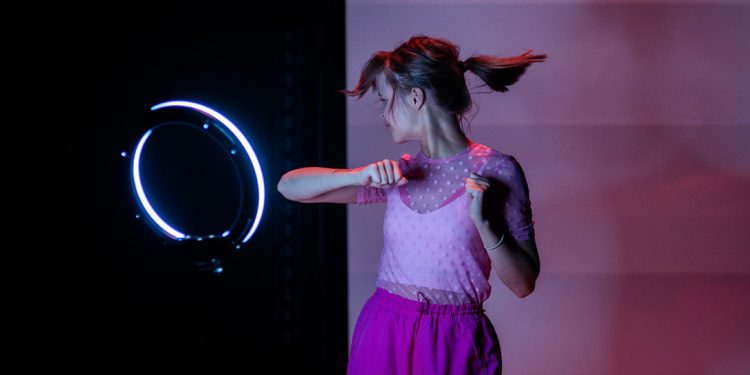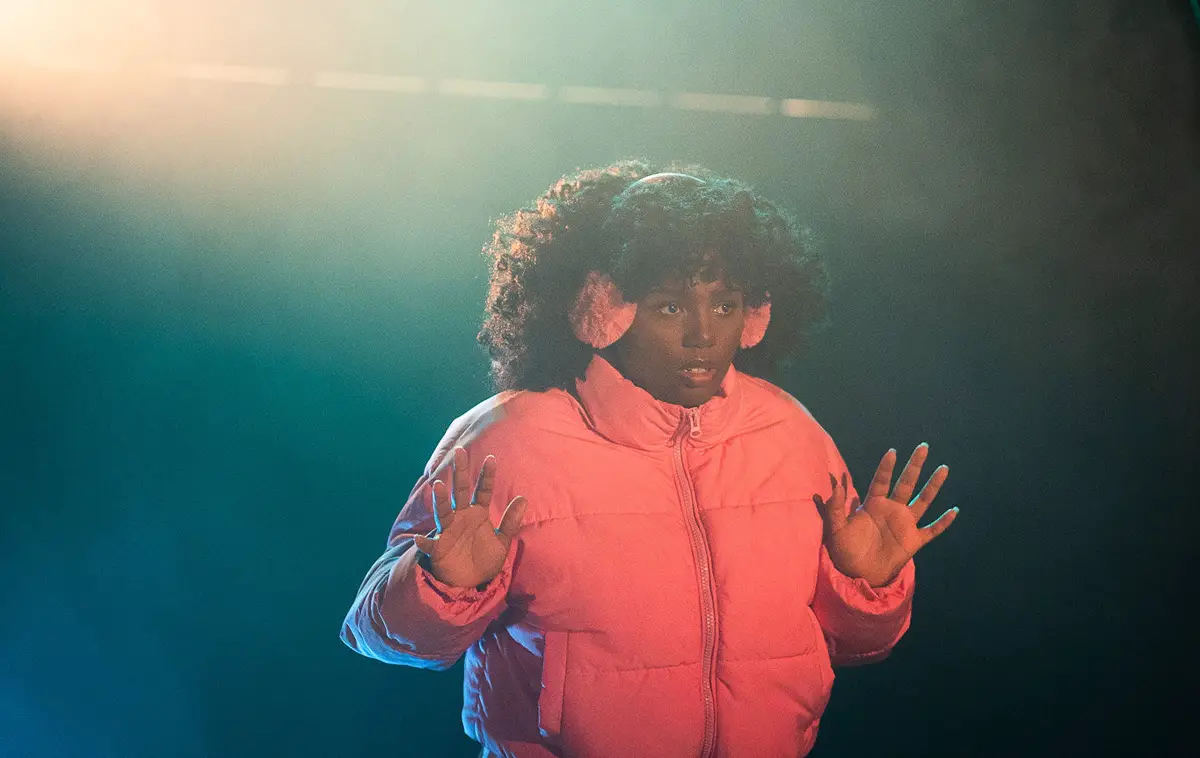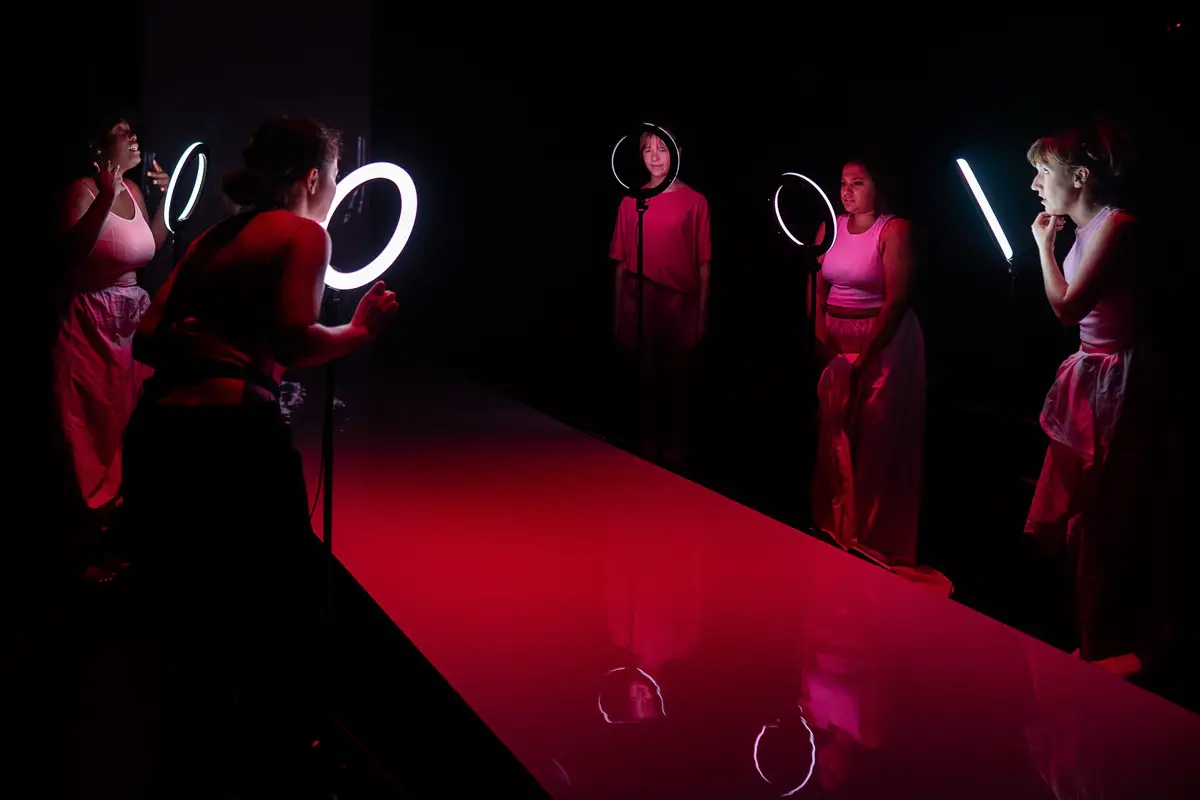We Could All Be Perfect – Review – Sheffield Playhouse

By Clare Jenkins, October 2023
Who’d be a teenage girl nowadays? Crying yourself to sleep at night over fears for the earth’s future, online trolling, lack of ‘likes’ for your Snapchat videos or Insta posts… Never thin enough, busty enough, pouty or popular enough…
Research published last year found that over half of teenage girls in England were suffering from poor mental health. According to the Daily Telegraph, “Almost a quarter said they had self-harmed in the previous year and 11 per cent said they had attempted suicide”.
While much of that can be attributed to the isolation and fear caused by the pandemic, other causes included bullying, family tensions and “identifying as gender non-binary”.
Those are some of the issues flashing with the speed of social media posts through Hannah Morley’s debut play, We Could All Be Perfect. But instead of adding to the doom and gloom of ‘moody teenagers’, they’re dealt with deftly and engagingly, by the playwright, by director Ruby Clarke and by the wonderful young cast – Heather Forster, Rosa Hesmondhalgh, Alice Walker, Jada-Li Warrican and, on Wednesday night, the playwright herself, covering for an indisposed Anshula Bain.
I say ‘play’, but it’s really a kaleidoscope of sketches, performed on a narrow white, underlit runway dividing the audience in half. Brief snapshots into mysterious lives, they range from first loves and kisses through fractions and fringes (both Things, apparently, among teenage girls) to embryonic campaigning and taking a knife to a painting of Medusa’s backside.
Some of the lines are glorious: “I am a seagull and this man is chips… The mighty cervix that will destroy us all… I sometimes think if I just had a different nose, then everything would be sorted… I’m beautiful, I could paint myself on stained glass windows…”
“Raw energy”
Injected into these are the more serious, complex issues: “They are killing girls in my country… They take away our voice… I think I take up too much space… Everyone had this amount of clarity when they were our age, they just lost it.”
Both adults and teenagers in the Wednesday night audience seemed a tad unresponsive – was it too fast and furious for them? Too mystifying? Or too quiet – the cast, fierce, funny and full of raw energy, could all do with projecting their voices more, to reach the further corners.
There’s a scene with a pink gramophone (the girls always wear pink unless they’re portraying boys-in-black) and Edwardian girls in nightgowns getting orgasmic to Rachmaninov’s 2nd Piano Concerto. Another where girls in Mary Quant-style minidresses and metallic 60s boots run onstage screaming. “Why are we screaming?” one asks. “I don’t know, but it feels good!” And off they run, still screaming and laughing.
Back in the 60s, if such girls had turned up backstage at a concert, the band would probably have bedded them. In today’s #MeToo era, when a shy fan turns up with a pink cake, the musician can’t get rid of her fast enough.
A girl posing as Joan of Arc (I think – there are times when a giant inflatable pink hand with names on would be handy to signpost characters) is told by the artist not to smile, because “You’re going to be burnt to death, your armour is going to melt, your skin will peel, your blood will turn black…”
A Jane Austen-type character, instead of accepting a proposal of marriage from the man she obviously loves, gives her kneeling suitor a list of what she wants him to do. It includes being eaten alive by her yet saying thank you… “Then I might feel that I have had some say in the matter.”
“Untamed”
Other scenes have the girls staring into glowing white mirror-cameras rehearsing dance moves (to Chinchilla’s empowering ‘Little Girl Gone’) or applying make-up as they make self-obsessed TikTok videos: “It’s very important to do a shiny face.”
There’s talk of “grandma’s tray bakes” and an imminent school massacre (“don’t film anything, though”), casual vaping and eating disorders, the threateningly thin line between victimhood and bully, and a touchingly funny scene where a boy has asked his girlfriend for nude pictures and she’s given him her own drawings. As he tries to explain what he’s really after, and she tries to explain that her art is more truthful, you can see them both grappling with burgeoning sexuality and peer expectations, riven with misunderstanding.
The longest speech is given to Heather Forster’s Greta Thunberg, standing on the Playhouse balcony as though at the UN, with tears in her eyes as she warns of environmental catastrophe. Otherwise it’s a minute here, 30 seconds there, accompanied by dizzyingly quick costume changes.
What they’re all after is a youthful Utopia, “a republic where everyone is just a teenage girl,” untamed and acting according to their own rules. Where girl power really means female power (not just another patriarchal pretence). Where idealism doesn’t become compromised or blunted by age but remains strong and true.
Ultimately, where the notion of “we could all be perfect if we just tried a little harder” is replaced by Jane Eyre’s “I am no bird; and no net ensnares me: I am a free human being with an independent will.”
‘We Could All Be Perfect’ is in Sheffield until Saturday 14th October
images: Becky Payne










